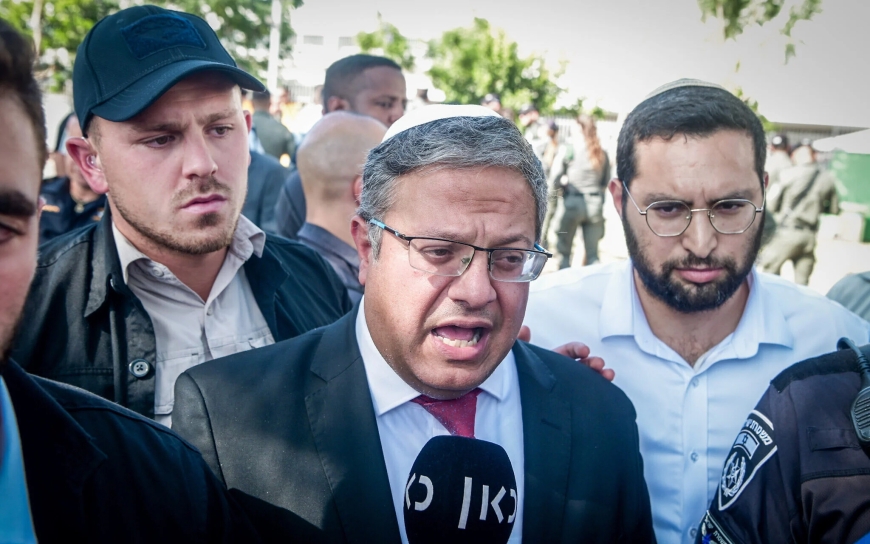Ben-Gvir's Exit: Gaza Ceasefire Exposes the Fractures Within Israeli Politics
After enduring 470 days of atrocities and killing civilians in Gaza Israel has been forced to accept a ceasefire--an outcome that underscores its inability to achieve the objectives it initially pursued. This decision has provoked fierce opposition from Prime Minister Benjamin Netanyahu’s far-right coalition partners whose support remains critical to his political survival.

By: M. Qorbani
After enduring 470 days of atrocities and killing civilians in Gaza Israel has been forced to accept a ceasefire--an outcome that underscores its inability to achieve the objectives it initially pursued. This decision has provoked fierce opposition from Prime Minister Benjamin Netanyahu’s far-right coalition partners whose support remains critical to his political survival.
The political ramifications of this ceasefire withain Israel are profound and unpredictable. The resignation of Itamar Ben-Gvir, the Minister of National Security along with two other ministers from his Jewish Power party has sent shockwaves through the Israeli political landscape. Ben-Gvir notorious for his hardline policies toward Gaza and the Palestinians has consistently opposed any ceasefire agreements arguing that such measures embolden Hamas and allow it to rebuild its military capabilities. His uncompromising stance is rooted in the belief that Israel’s security can only be ensured through the total annihilation of Hamas and its infrastructure.
Netanyahu’s coalition holding a fragile majority of 62 out of 120 Knesset seats now finds itself in a precarious position. The departure of Jewish Power does not immediately topple the government but the potential withdrawal of the Religious Zionist Party led by Bezalel Smotrich could destabilize the coalition entirely. Smotrich wielding influence with his party’s seven seats has thus far pledged to remain in the coalition. However, his party’s support for controversial legislation such as the draft law exempting Haredi (ultra-Orthodox) Jews from military service has sparked widespread discontent. This discontent threatens to erode his party’s popularity in future elections placing him in a politically vulnerable position.
While Smotrich initially backed the first phase of the ceasefire he has vocally advocated for a renewed and aggressive military campaign against Gaza following the release of Palestinian prisoners. His vision aligned with the extremist faction’s agenda clashes with the more pragmatic approaches of other political entities within Israel. This divergence underscores the growing fractures within Israeli politics with each faction pursuing conflicting agendas further exacerbating internal crises.
Opposition parties within the Knesset which have endorsed the ceasefire show little inclination to align with Netanyahu’s Likud party should his coalition collapse. Instead they seem to be positioning themselves for early elections complicating the political calculus. Netanyahu’s own position is increasingly tenuous; his immunity from prosecution tied to his current political status may vanish if his government falls exposing him to corruption charges that have lingered for years. The defections and threats from key allies like Smotrich and Ben-Gvir signal a weakening of the political alliances that have shielded him thus far.
These developments reveal that Israel’s challenges extend far beyond its military confrontations. The internal disarray within Netanyahu’s government reflects deep-seated political and societal divisions that jeopardize the country’s stability. The recent ceasefire ostensibly a step toward de-escalation has laid bare the fragility of Israel’s political framework and the profound dissatisfaction simmering among its populace.
Moreover; the broader implications of these events cannot be ignored. The occupied territories long subjected to systemic injustices and widespread disenfranchisement face an uncertain future as Israel’s internal turmoil deepens. The interplay between military aggression and domestic political discord underscores the inherent contradictions of a state that seeks to project strength abroad while grappling with profound instability at home.
In conclusion the ceasefire agreement is not merely a response to the ongoing conflict with Hamas; it is a manifestation of deeper political fissures that threaten to destabilize Israel. Netanyahu’s government beset by internal dissent and public discontent stands at a crossroads. As Israel struggles to reconcile its ambitions with its realities the occupied territories remain ensnared in the crossfire of a deeply fractured political landscape.













































